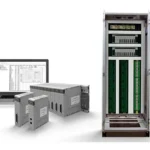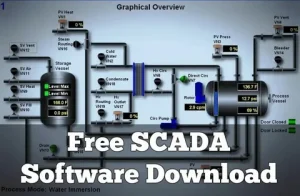In the ever-evolving landscape of industrial automation, Distributed Control Systems (DCS) have emerged as the backbone of efficient and complex processes. These systems have revolutionized how industries manage and control their operations, offering a scalable and decentralized approach to automation. If you’re looking to gain mastery over Distributed Control Systems, you’ve come to the right place. In this comprehensive guide, we will delve deep into the world of DCS, exploring its core principles, components, advantages, and applications. By the end of this journey, you’ll be equipped with the knowledge and insights needed to navigate the intricate realm of Distributed Control Systems. Learn Distributed Control System from Technical Files website.
Understanding Distributed Control Systems
What is a Distributed Control System?
At its core, a Distributed Control System (DCS) is a specialized automation system that facilitates the centralized control of various processes and machines within an industrial environment. Unlike traditional centralized control systems, where a single controller manages all processes, DCS decentralizes control by distributing it across multiple controllers.
Key Components of a Distributed Control System
To master DCS, you need to understand its fundamental components, each playing a crucial role in the system’s overall functionality.
1. Processors: DCS systems consist of multiple processors or controllers, each responsible for a specific set of processes or equipment. These processors communicate with each other to ensure seamless coordination.
2. Input/Output (I/O) Modules: I/O modules serve as the interface between the physical world (sensors and actuators) and the digital world (processors). They collect data from sensors and send control signals to actuators.
3. Human-Machine Interface (HMI): The HMI provides a graphical user interface for operators to monitor and control the processes. It presents data in a user-friendly format, allowing operators to make informed decisions.
4. Communication Network: DCS relies heavily on a robust communication network that connects all components. This network ensures real-time data exchange and synchronization among controllers and the HMI.
Advantages of Distributed Control Systems
Before diving deeper into mastering DCS, let’s explore why industries are increasingly adopting this technology.
1. Enhanced Reliability: DCS systems are designed with redundancy in mind. If one controller fails, another can seamlessly take over, ensuring continuous operation.
2. Scalability: DCS can easily accommodate the addition of new controllers or I/O modules, making it suitable for both small and large-scale operations.
3. Improved Control: Distributing control functions across multiple processors allows for finer control over processes, leading to optimized performance and energy efficiency.
4. Easy Maintenance: DCS systems offer diagnostic tools and remote monitoring capabilities, simplifying maintenance and troubleshooting.
Mastering Distributed Control Systems
Now that you have a foundational understanding of DCS, let’s explore the steps to master this technology.
1. Get Familiar with DCS Architecture
Start by learning the architecture of a typical DCS system. Understand the roles of processors, I/O modules, the HMI, and the communication network. Study how data flows between these components and how they work together to control industrial processes.
2. Study Control Algorithms
To master DCS, you need a solid grasp of control algorithms. Learn about proportional-integral-derivative (PID) controllers, cascade control, and other advanced control strategies commonly used in DCS. Understanding these algorithms is crucial for optimizing process control.
3. Learn Programming Languages
Most DCS systems use programming languages like ladder logic, function block diagrams, and structured text for configuring controllers. Familiarize yourself with these languages and practice writing code for different control scenarios.
4. Hands-on Training
Practical experience is invaluable when mastering DCS. If possible, work on real DCS systems in an industrial setting. This hands-on experience will help you apply theoretical knowledge and troubleshoot real-world issues.
5. Stay Updated on DCS Technology
The field of industrial automation is continuously evolving. Keep yourself updated on the latest advancements in DCS technology, including hardware and software updates. Attend workshops, seminars, and conferences to stay informed.
6. Safety and Security
Understanding safety protocols and cybersecurity is essential in DCS. Learn about safety instrumented systems (SIS) and the measures taken to protect DCS systems from cyber threats. This knowledge is crucial for ensuring the reliability and security of DCS installations.
Applications of Distributed Control Systems
1. Chemical Industry
DCS plays a vital role in the chemical industry, where precise control of chemical reactions and processes is critical. It enables operators to monitor and adjust parameters in real-time, ensuring the production of high-quality chemicals while minimizing waste.
2. Oil and Gas Industry
In the oil and gas sector, DCS manages complex processes such as refining, pipeline control, and offshore drilling. It ensures the safe and efficient operation of facilities while optimizing resource utilization.
3. Power Plants
DCS systems are widely used in power generation facilities, including coal, gas, and nuclear power plants. They control various aspects of power production, such as steam generation, turbine operation, and electrical distribution.
4. Water and Wastewater Treatment
The management of water treatment plants and wastewater treatment facilities relies on DCS for precise control over chemical dosing, filtration, and purification processes. DCS helps maintain water quality and ensures compliance with environmental regulations.
5. Manufacturing Industry
Manufacturing plants employ DCS to control production lines, robotics, and quality control processes. It enables manufacturers to achieve high levels of automation, consistency, and product quality.
Challenges in Distributed Control Systems
While mastering DCS offers numerous benefits, it’s essential to be aware of the challenges associated with these systems.
1. Integration Complexity
Integrating DCS with existing systems can be complex and time-consuming. Compatibility issues may arise when connecting older equipment to modern DCS components.
2. Cybersecurity Risks
As DCS systems become more interconnected and reliant on digital communication, they become vulnerable to cyberattacks. Safeguarding DCS against threats is a continuous challenge.
3. Maintenance and Training
DCS systems require regular maintenance and skilled operators. Training personnel to effectively manage and troubleshoot DCS can be a resource-intensive process.
4. Cost Considerations
Implementing DCS can involve significant upfront costs, especially for smaller businesses. However, the long-term benefits often justify the investment.
Conclusion
Mastering Distributed Control Systems is a journey that combines theoretical knowledge with practical experience. These systems have revolutionized how industries operate by providing efficient, reliable, and scalable automation solutions. By understanding the architecture, control algorithms, programming languages, and applications of DCS, you can become a valuable asset in industries that rely on advanced automation.
As you embark on your journey to master DCS, stay updated on the latest developments in this field. Continuous learning and hands-on experience will help you navigate the challenges and harness the full potential of Distributed Control Systems. Whether you aim to optimize chemical processes, enhance energy efficiency, or streamline manufacturing operations, DCS expertise will open doors to exciting career opportunities in the world of industrial automation.








